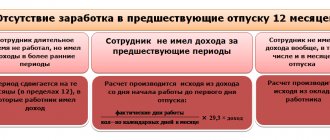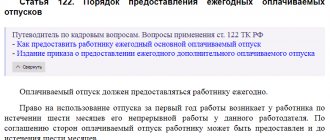You cannot simply recall an employee from vacation. To do this, the employer must have justifiable reasons.
In addition, we must not forget about Part 2 of Art. 125 of the Labor Code of the Russian Federation, which states that recall of an employee from vacation is allowed only with his consent. If there is no agreement, then revocation is impossible. If it is possible to reach an agreement with the employee, then the unused part of the vacation should be provided at the employee’s choice at a time convenient for him during the current working year or added to the vacation for the next working year. In this case, the vacation schedule plays an important role. If this document is maintained by the company in good faith, then when recalling an employee from vacation, you must make a note in the schedule for what period you are postponing the vacation. For this purpose there is a corresponding column 10 “Note”.
In the matter of an employee’s independent choice of the period during the working year when he will complete his vacation, it is important to remember one more detail: the working year is not equal to the calendar year. The working year is calculated from the date of execution of the employment contract with the employee. So, if you hired an employee on September 1, 2019, then from this day a work year report will be kept (from September 1, 2021 to August 31, 2021).
Obtaining the employee’s consent
After the employer decides to recall an employee from vacation, he must inform the employee about this and obtain the latter’s consent to recall from vacation (Part 2 of Article 125 of the Labor Code of the Russian Federation). You can inform the employee in the following ways - by telephone, by telegram, by e-mail, and it is better to document the consent.
Art. 125 of the Labor Code of the Russian Federation does not contain explanations in what form consent to recall from vacation must be given. How to do this, the organization must decide independently.
For example, an organization may notify an employee in writing of its decision to recall him from leave.
The employee, having read such a notice, either refuses to interrupt the vacation or agrees, indicating at the same time how he intends to dispose of the remaining part of it.
This option is also possible. The organization does not contact the employee in writing, and the corresponding notice is not issued. You can call an employee to work by phone, telegram, email, or other method. In this case, the employee expresses his consent to the early termination of vacation in a handwritten statement. In it, he indicates how he intends to complete the days remaining from his vacation, as well as the procedure for settlements with the employer for excess payments received.
How to deal with vacation pay? There are two options: voluntary deposit of overpaid amounts into the organization’s cash desk or their offset against upcoming wages. The employee can reflect all this either directly in the notice to the employer or in a statement written in his own hand. It all depends on how the organization customizes documenting vacation reviews.
Results
Various circumstances force an employee to be recalled from an employer’s vacation: a sudden tax audit, a broken computer network, etc. In order for the procedure for recall from vacation to be official and legal, it is necessary to issue a separate order, the employee’s consent to be recalled from vacation, as well as consent to withholding vacation pay for days of recall from vacation.
An employee’s refusal to interrupt his or her vacation early will not be considered a violation of labor discipline.
In this case, there is no need to issue an order. You can find more complete information on the topic in ConsultantPlus. Free trial access to the system for 2 days.
We make changes to the vacation schedule and personal card
After issuing an order to recall an employee from vacation, changes must be made to the vacation schedule. Since it does not contain a special column for entering information about the employee’s recall from vacation, you can enter information in column 10 “Note”. It should indicate that the employee was recalled from vacation with his consent, indicate the date on which the employee began work in connection with the recall from vacation, and the reason for the recall.
Next, in column 8 “Bases (document)” it is necessary to reflect the details of the order for recall from vacation. In column 9 “Date of proposed vacation” - the date to which the employee’s vacation is transferred if it falls within the current calendar year. If the date to which the vacation is transferred falls on the next calendar year, then nothing needs to be indicated in the schedule.
Information about recall from vacation must also be entered into the employee’s personal card - Form No. T-2 in the “Vacation” section.
In columns 4 and 6 you need to cross out the incorrect dates and number of days with one line and enter the correct information, and in column 7 indicate the details of the order on the basis of which the changes occurred.
The employee’s personal card should reflect the number of vacation days actually used. This is necessary in order to subsequently correctly calculate the number of unused vacation days.
How to justify a review and write the basis for an order
Every order issued in an organization must be justified in some way and have some basis. In this case, the justification may be production necessity, and as a basis you can refer either to a memo from the head of the structural unit (shop, site, department) in which the recalled employee works, or to a specific article of the Labor Code of the Russian Federation, which allows you to recall employees organizations from planned vacations.
How to place an order
The legislation does not impose any criteria for the execution of an order, as well as for its preparation: it can be written by hand or typed on a computer on a regular sheet of any convenient format or on the organization’s letterhead.
An order is always issued on behalf of the head of the company, so it must be signed by him personally or by a representative authorized to act on his behalf. Also, the document must be signed by the persons responsible for its implementation (usually a specialist in the personnel department, an accountant) and the employee to whom the order directly concerns.
If the local acts of the company stipulate the obligation to use a seal to endorse internal papers, then the order form should be stamped.
The order is usually written in a single original copy, but if necessary, certified copies can be made.
After drawing up, the document is registered in the internal documentation journal, and then transferred for storage along with other administrative papers of the company.
Can any employee be recalled from vacation?
No, not just anyone!
The legislator recognizes the social importance of proper rest for workers. Therefore, when filing a recall, you must take into account that there are categories of workers who, under no circumstances, can be recalled from vacation, no matter how long it may be. In accordance with Part 3 of Art. 125 of the Labor Code of the Russian Federation, recall from vacation is not allowed:
- pregnant women;
- workers engaged in harmful or dangerous work;
- minors.
Note! The same categories cannot be replaced with compensation for part of their vacation (Article 126 of the Labor Code of the Russian Federation). The vacation of such employees can only be postponed - on the basis of a personal application and before its start in the manner prescribed by the local regulatory act (LNA). Its preparation is described in the article “Application for rescheduling vacation - sample.”
ConsultantPlus has many ready-made solutions, including the “Guide to HR Issues: Annual Paid Leave.” If you don't have access yet, you can sign up for a free trial on a temporary basis!
Insurance premiums
Vacation pay and wages are accrued to the employee as part of the employment relationship.
Therefore, the amounts of wages and vacation pay paid to an employee under an employment contract are recognized as subject to insurance contributions for compulsory pension insurance, compulsory social insurance in case of temporary disability and in connection with maternity, compulsory medical insurance, as well as compulsory social insurance from accidents at work and occupational diseases (clause 1, clause 1, article 420 of the Tax Code of the Russian Federation, clause 1, article 20.1 of the Federal Law of July 24, 1998 N 125-FZ “On compulsory social insurance against accidents at work and occupational diseases "(hereinafter referred to as Law No. 125-FZ)).
The organization calculates and pays insurance premiums based on the results of the calendar month based on the base for their calculation from the beginning of the billing period (calendar year) to the end of the corresponding calendar month and the rates of insurance premiums minus the amounts of insurance premiums calculated from the beginning of the billing period to the previous calendar month inclusive.
This follows from paragraph 1 of Art. 421, paragraph 1, art. 423, paragraph 1, art. 431 Tax Code of the Russian Federation, paragraph 2 of Art. 20.1, paragraph 1, 9 art. 22.1 of Law No. 125-FZ.
Accrual and payment of vacation pay
The organization's obligations in connection with the emergence of employees' right to paid vacations (including the amount of insurance contributions) are estimated liabilities (clause “a”, clause 2, clause 5 of the Accounting Regulations “Estimated liabilities, contingent liabilities and contingent assets” (PBU 8/2010), approved by Order of the Ministry of Finance of Russia dated December 13, 2010 N 167n).
Thus, earlier, as the organization’s employees received the right to annual paid leave, the organization formed a corresponding estimated liability, the amount of which was attributed to expenses for ordinary activities (clause 8 of PBU 8/2010, clause 5, paragraph 3, 4 clause 8, clause 18 of the Accounting Regulations “Expenses of the Organization” PBU 10/99, approved by Order of the Ministry of Finance of Russia dated 05/06/1999 N 33n).
In accounting, the estimated liability is reflected depending on what type of personnel (production, managerial, etc.) the employee of the organization belongs to in the debit of accounts 20 “Main production” (26 “General expenses” or 44 “Sales expenses”) and credit account 96 “Reserves for future expenses” (Instructions for the application of the Chart of Accounts for accounting of financial and economic activities of organizations, approved by Order of the Ministry of Finance of Russia dated October 31, 2000 N 94n).
The amount of an employee’s wages for working days falling on unused calendar days of vacation, as well as the amount of corresponding insurance premiums depending on the functions performed, relate to production, administrative or commercial expenses of the organization and qualify as expenses for ordinary activities (clause 5, paragraph 3 clause 7, paragraph 3, 4 clause 8 PBU 10/99).
These expenses are taken into account on the dates of calculation of wages and insurance contributions, respectively (clauses 16, 18 of PBU 10/99).
When an employee is granted leave, the accrued amounts of vacation pay and the corresponding amounts of insurance premiums are attributed to the previously formed estimated liability by entries in the debit of account 96 and the credit of accounts 70 “Settlements with personnel for wages” (in terms of the amount of vacation pay) and 69 “Settlements for social insurance and provision" (in terms of insurance premiums) (paragraph 1, 2, paragraph 21 of PBU 8/2010).
Income tax: accrual and payment of vacation pay
The amount of wages accrued for working days falling on unused vacation days is included in labor costs on the basis of clause 1 of Art. 255 of the Tax Code of the Russian Federation and is recognized as an expense in the month of accrual of this amount (clause 4 of Article 272 of the Tax Code of the Russian Federation).
The corresponding insurance premiums are other expenses associated with production and sales, the date of which is the date of accrual of insurance premiums (clauses 1, 45, clause 1, article 264, subclause 1, clause 7, article 272 of the Tax Code of the Russian Federation).
The amount of vacation pay due to an employee is, for tax purposes, a labor expense (Clause 7, Article 255 of the Tax Code of the Russian Federation).
Such expenses are recognized as expenses on a monthly basis based on accrued amounts (clause 4 of Article 272 of the Tax Code of the Russian Federation).
The corresponding insurance premiums relate to other expenses associated with production and sales (clauses 1, 45, clause 1, article 264 of the Tax Code of the Russian Federation).
The date of expenses in the form of insurance premiums is the date of their accrual (clause 1, clause 7, article 272 of the Tax Code of the Russian Federation).
The moment of recognition in tax accounting of any expenses, except non-operating ones, depends on whether they relate to direct or indirect expenses (clause 1 of Article 318 of the Tax Code of the Russian Federation).
The organization determines the list of direct expenses independently, and all other amounts of expenses, with the exception of non-operating expenses, relate to indirect expenses (paragraph 9, 10, paragraph 1, article 318 of the Tax Code of the Russian Federation).
At the same time, from the wording of the Tax Code of the Russian Federation it follows that direct costs are expenses directly related to the production process (paragraph 10, paragraph 1, Article 318 of the Tax Code of the Russian Federation) (see Letter of the Federal Tax Service of Russia dated February 24, 2011 N KE-4-3/ [email protected] “On the procedure for distributing, for profit tax purposes, costs of production and sales into direct and indirect ones”).
Thus, if the employee is not associated with the production process, then for tax purposes the amount of the employee’s vacation pay and the amount of the corresponding insurance contributions can be qualified as indirect expenses and taken into account in full during the period of their accrual (clause 2 of article 318, paragraph 3 of article 314 Tax Code of the Russian Federation).
If the employee is associated with the production process, then for tax purposes the amount of the employee’s vacation pay and the amount of the corresponding insurance premiums are qualified as direct costs directly related to the production of goods (performance of work, provision of services) and are taken into account as follows:
- Direct costs are distributed among work in progress and products manufactured in the current month (work performed, services rendered)
- Direct expenses refer to the costs of the current reporting (tax) period as products (works, services) are sold, in the cost of which they are taken into account in accordance with Article 319 of the Code.
- If an organization has direct expenses related to work in progress, balances of finished products and goods shipped but not sold, then until the sale of products and these goods occurs, these amounts of direct expenses are not taken into account in the income tax base.
Application of PBU 18/02: accrual and payment of vacation pay
If an organization does not create reserves for vacations in tax accounting, then in this case it is necessary to apply the Accounting Regulations “Accounting for calculations of corporate income tax” PBU 18/02, approved by Order of the Ministry of Finance of Russia dated November 19, 2002 N 114n (hereinafter referred to as PBU 18/ 02).
In accounting, expenses associated with vacation amounts and related insurance premiums were recognized earlier when the provision was created.
But such expenses were not previously recognized in tax accounting.
As a result, a deductible temporary difference (DTD) and a corresponding deferred tax asset (DTA) previously arose in the organization’s accounting (clauses 11, 14 of PBU 18/02).
Further, when vacation pay and insurance premiums accrued on them are included in tax accounting, the VVR and ONA that arose earlier are reduced (clause 17 of PBU 18/02).






